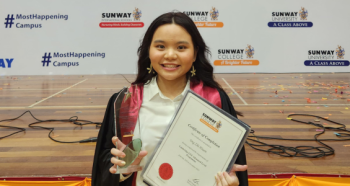Learning to learn and learning to teach are ongoing processes. It is our openness to try new ideas, methods and approaches that helps us advance in the ways we study and work.
The Covid-19 pandemic has given us the opportunity to explore online learning and the tools to use. We have learnt about the possibilities – and the limits – of technology and have made decisions on what works well and what we could improve. Many of us have also discovered that there are aspects of online learning that we want to continue – from teachers who have learned to use new digital tools, to learners who have discovered that they prefer an online learning environment.
In this post, we are going to share what teachers from around the world have told us about their experiences of teaching and learning online since the start of 2020. We will show that Cambridge teachers who are reflective and innovative in their practice, and who take responsibility for supporting their learners’ needs, can quickly become confident with new tools and ways of working – whether in physical school or in a fully online environment. Teachers’ willingness to embrace new ways of thinking and working can also encourage students’ motivation to try out different learning strategies.
What have schools told us about teaching and learning online?
Our research team recently spoke to Cambridge International schools around the world about their experiences during the pandemic. What we heard most was that teaching approaches had to change – especially in terms of learner agency and independence. All teachers were aware of flipped learning pre-pandemic, but the emergency situation meant that schools were forced to explore new ways of doing things – some of which they want to continue with in the future. Schools told us that:
Peer-to-peer learning flourished in some situations, supported by technology. Yet importantly, this was through the expertise of the teacher to support engaging learning.
“We were overwhelmed …astonished by the result because it was great….[Students] felt extremely responsible for the whole class. Not just for themselves, so they wanted to do a good job, not just get a good mark.”
Lesson content had to be adapted with a greater focus on skills and key concepts. Effective teachers always adapt to their situation and requirements, but the use of technology created many opportunities during the pandemic.
It was important to be realistic about the pace of learning, which was often slower.
“We had to pay more attention to [students’] feelings, rather than just their learning, because they were going through more difficult times and teachers noticed that more than when they’re in the classroom”
The challenge of live video-based lessons meant it was much harder to read the room. As teachers developed and explored additional ways to adapt, it became important to find the right balance of synchronous and asynchronous lessons. Some learners found a completely asynchronous learning approach challenging.
“We prefer to have the teacher along with us there because we don’t know how to manage time – we get lost.”
Many schools attempted a hybrid approach, with students learning in the classroom and remotely at the same time. However, one clear outcome of the research is this type of hybrid learning approach was not a successful experience for both teachers and learners:
“Honestly I don’t think [hybrid learning] works because either something is meant for online delivery or for face-to-face delivery.”
How has classroom practice changed?
During the pandemic, teachers were able to adapt to the extraordinary circumstances – which is testament to the resilience of Cambridge teachers and learners. Teachers have successfully overcome the reality of pandemic learning in a number of ways:
Planning concentrated lessons.
“I really learned how to compress the activity and just focus on the key elements. It’s really, really worked.”
Using compassionate questioning (warm calling).
“I inform shy students a day beforehand that tomorrow I will call upon you to answer this [question]. We’re looking at really socially including [students] in whatever strategic way possible, with kindness and with empathy.”
Working with other teachers in the department, using technology to make lessons varied and engaging.
“We have a student workload distribution sheet so different subject teachers plot different assignments, different homework, different research activities.”
Allowing older students more autonomy and flexibility.
“What this experience taught me was to consider students’ ability to carry out their own learning. We have to push them a bit because…they’ve got lots of inner resources they want to be using.”
Providing opportunities for personalised learning.
“We found that the asynchronous space has opened up this window of opportunity for us to personalise and differentiate our instruction … learning is happening at a deeper and more authentic level.”
How will we support schools going forward?
Successful teaching during the pandemic used technology as a tool for effective and impactful learning – Cambridge teachers around the world have clearly shown their ability to adapt and grasp the opportunities that technology provides. It is also clear that the Cambridge Teacher standards and the Cambridge learner attributes are now more important than ever, as the pandemic has shown the need for teachers and learners who are confident, responsible, reflective, innovative, and engaged.
We know that while many teachers and learners are happy to be returning to the physical classroom, some are keen to continue with an online approach. Schools who want to offer the Cambridge Pathway virtually to some or all of their students can now register as Cambridge International online schools. Find out more about our approach, and the different ways we work with online schools.
At Cambridge International, we will continue to support you so that you feel empowered and ready to adapt your teaching for the benefit of your learners – whether you are teaching in a physical school or online.
Useful resources
Here are some resources and professional development opportunities that you may find helpful:
- The Understanding Assessment course we developed last year to help you know more about both formative and summative assessment.
- The recorded presentations and workshops from our recent Cambridge Schools Conferences.
- The series of resources and webinars we produced to support you throughout the pandemic on teaching, learning and assessment, and on the social-emotional wellbeing of your learners.
- Our popular Cambridge Professional Development Qualifications.
- The blog articles we published last year on Six Top Tips for Online Teaching and Learning and on The Inclusive Benefits of Lockdown Learning.
This article was co-authored with Paul Ellis.
Thanks to Alison Rodrigues (Head of Cambridge International Research Hub) and Lynda Bramwell (Cambridge International School Liaison Manager) for their research as part of the CIRT Research Project: The impact on Covid-19. Contact the research team at cambridgeinternationalresearch@cambridge.org for further information.





